What Vegan Food Is Keto? A Comprehensive Guide
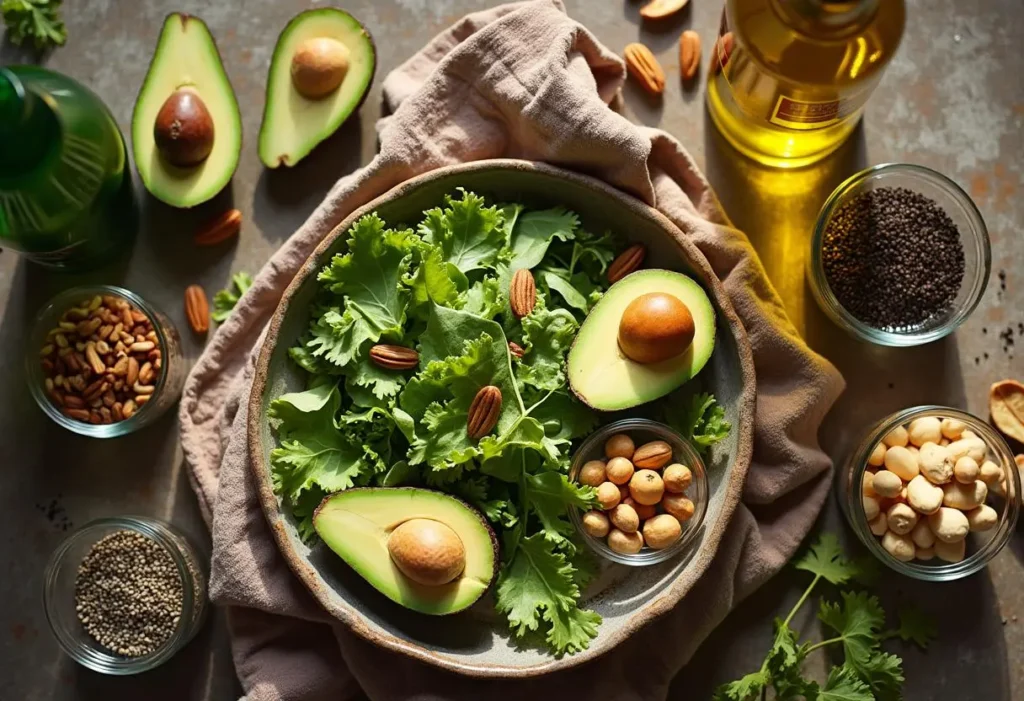
What vegan food is keto? This is a common question among people interested in combining plant-based eating with a low-carb ketogenic diet. While these two dietary lifestyles may seem incompatible at first, they can work together with proper planning. A vegan keto diet focuses on high-fat, low-carb, and moderate-protein foods derived entirely from plants. In this guide, we’ll explore the best vegan keto foods, meal plans, and practical tips to help you thrive on this unique diet.
What Is the Vegan Keto Diet?
The vegan keto diet is a plant-based, low-carb, high-fat dietary approach that induces ketosis. This metabolic state encourages your body to burn fat for energy instead of carbohydrates. The diet follows these macronutrient ratios:
| Macronutrient | Primary Sources | Recommended Examples | Key Benefits |
|---|---|---|---|
| Fat (75%) | Oils (olive, avocado, coconut), nuts (almonds, walnuts), seeds (chia, hemp), avocados | Olive oil, almond butter, coconut oil, macadamia nuts | Provides essential fatty acids and sustained energy |
| Protein (20%) | Tofu, tempeh, plant-based protein powders (unsweetened varieties) | Extra-firm tofu, tempeh slices, pea protein powder | Supports muscle repair and satiety |
| Carbohydrates (5%) | Non-starchy vegetables (spinach, kale, broccoli), low-carb fruits (berries, avocado) | Spinach, zucchini, raspberries, strawberries | Offers fiber, vitamins, and minerals while keeping carbs low |
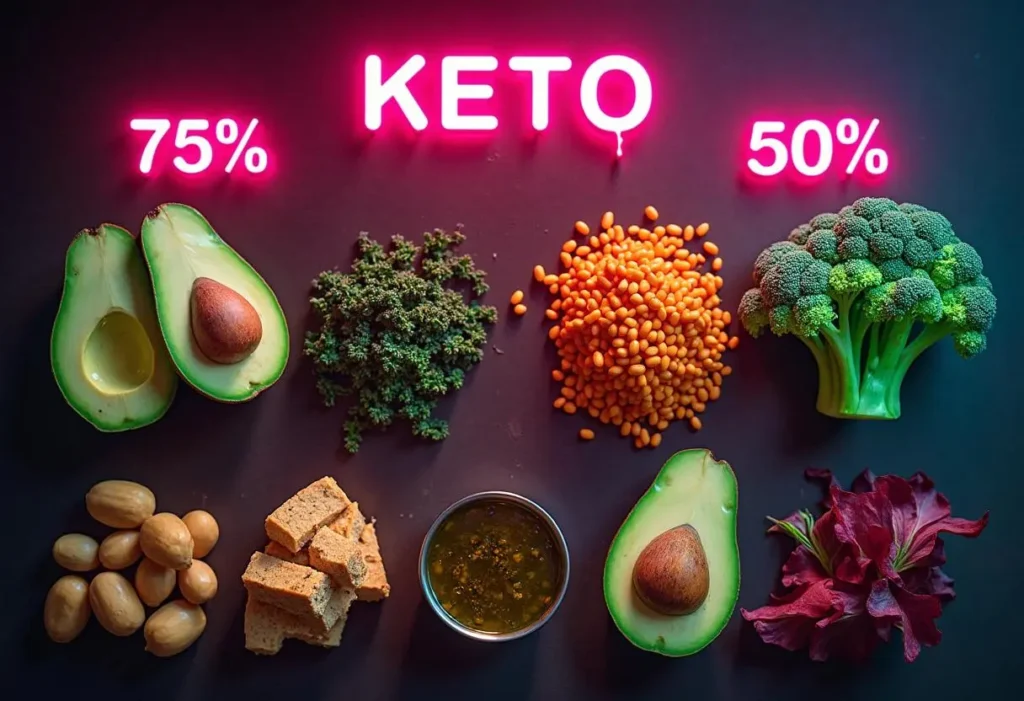
How It Works:
By minimizing carbs and increasing fat intake, the body transitions into ketosis. This helps with weight loss, better blood sugar control, and improved heart health. Furthermore, following a vegan keto diet may support reduced inflammation and energy stabilization.
Best Vegan Keto Foods to Eat
When thinking about what vegan food is keto, consider these essential categories:
Healthy Fats
- Oils: Olive oil, avocado oil, coconut oil
- Nuts & Seeds: Almonds, walnuts, chia seeds, hemp seeds
- Avocados: A nutrient-dense staple for plant-based keto diets
Plant-Based Proteins
- Tofu & Tempeh: Excellent protein sources that are nutrient-rich
- Vegan Protein Powders: Use unsweetened versions for smoothies
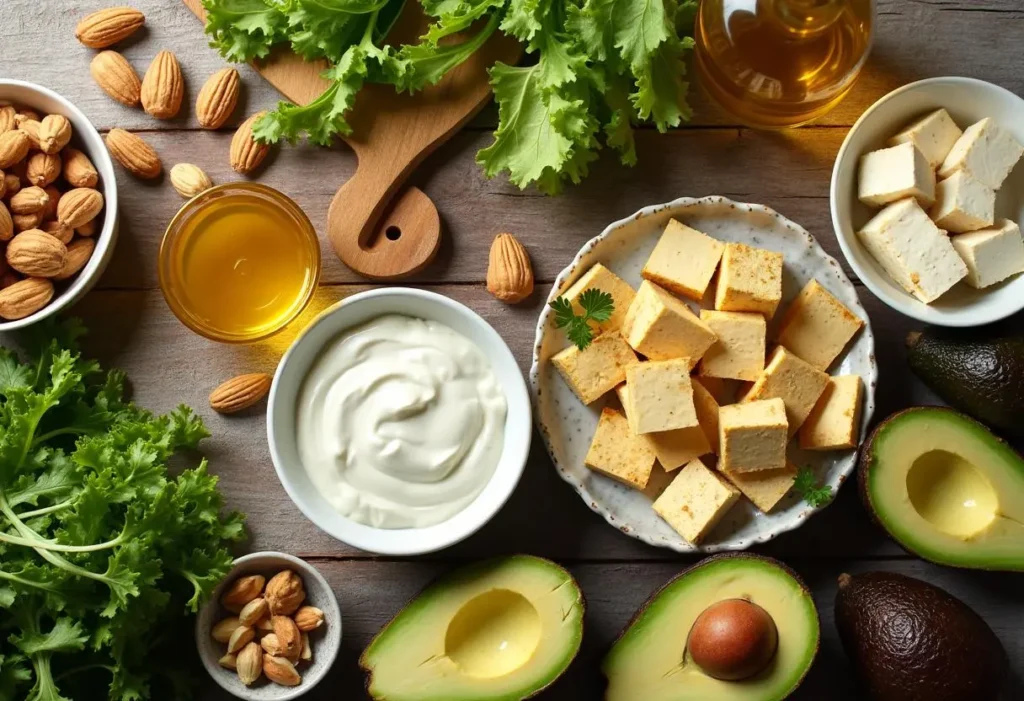
Low-Carb Vegetables
- Leafy Greens: Spinach, kale, and arugula
- Cruciferous Vegetables: Broccoli, cauliflower, and Brussels sprouts
Dairy Substitutes
- Coconut Yogurt: Choose unsweetened varieties
- Vegan Cheese: Opt for low-carb, high-fat brands
Related Reading: Explore delicious meal ideas in Vegan Keto Recipes – Your Ultimate Guide to Low-Carb Plant-Based Eating.
Foods to Avoid on a Vegan Keto Diet
Despite being plant-based, several foods are not keto-friendly due to their high carbohydrate content. Understanding these restrictions helps avoid nutritional imbalances.
Animal Products
- Meat, poultry, eggs, dairy
High-Carb Foods
- Rice, pasta, bread, potatoes, and grains
Sugary Foods
- Fruit juices, syrups, and candies
Starchy Vegetables
- Carrots, sweet potatoes, and corn
Processed Vegan Foods
- Packaged plant-based meats with hidden sugars and carbs
Vegan Keto Meal Ideas
Crafting plant-based keto meals can be straightforward when you choose the right ingredients. Here are some simple meal ideas that fit the vegan keto diet.
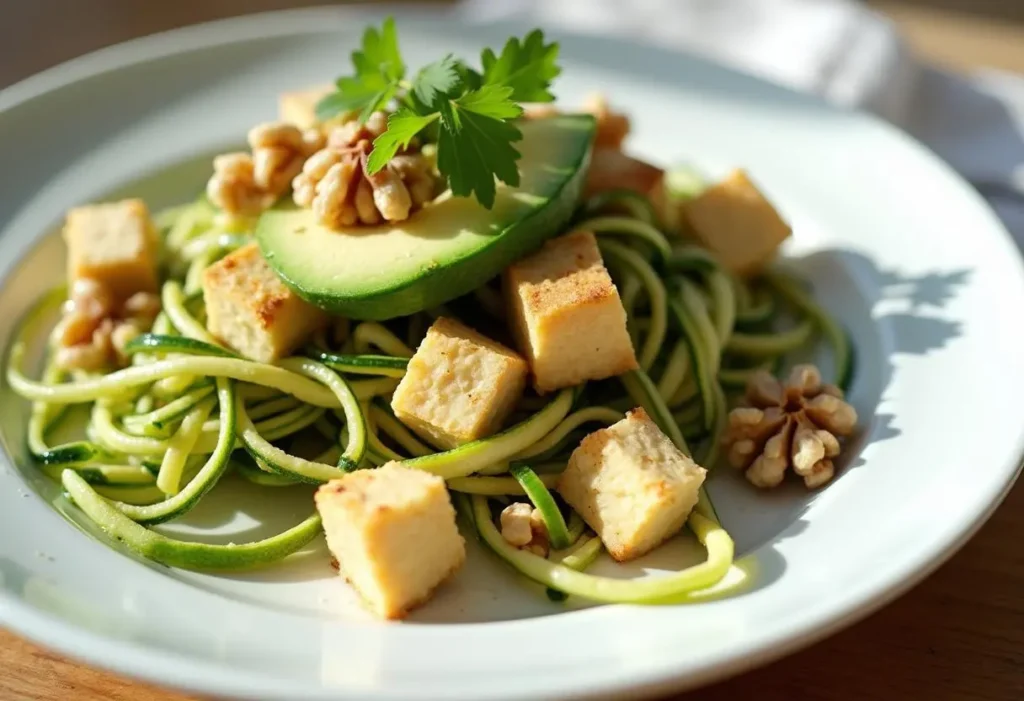
Breakfast
- Coconut chia pudding with nuts and seeds
- Tofu scramble with avocado and spinach
Lunch
- Zucchini noodles with walnut pesto
- Cauliflower fried rice with tofu and broccoli
Dinner
- Vegan mushroom Alfredo over konjac noodles
- Eggplant lasagna with cashew cheese
Need keto-friendly desserts? Try recipes from Keto Vegan Desserts – The Ultimate Guide for plant-based treats.
Best Vegan Keto Snacks
Snacking on a vegan keto diet is easy when you choose high-fat, low-carb foods. Here are some satisfying snack ideas:
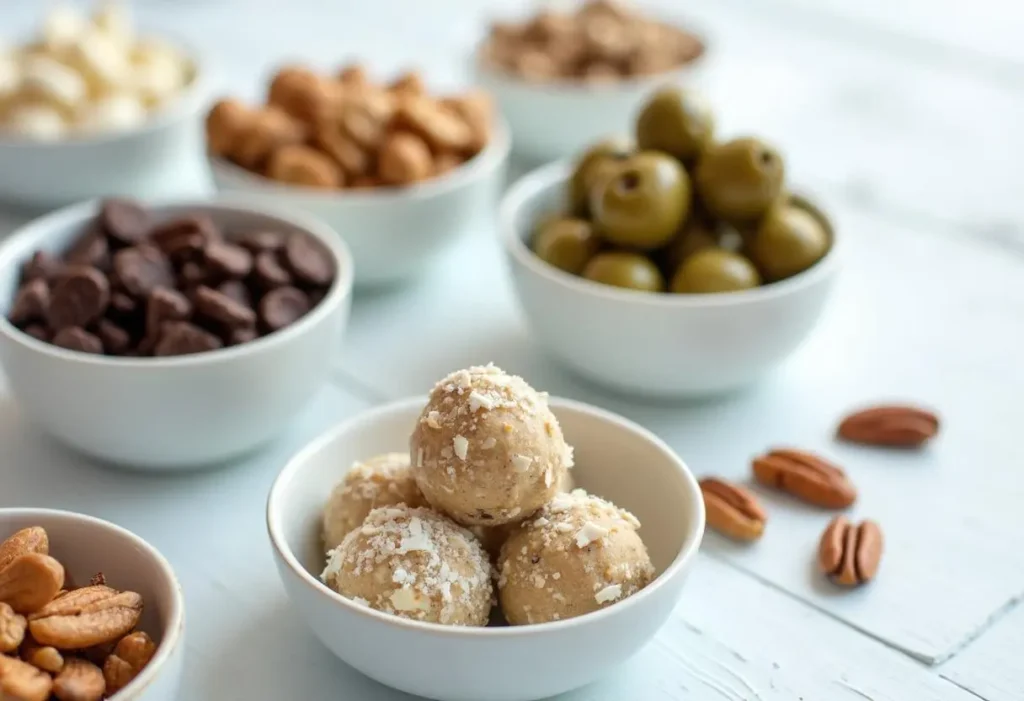
- Nut Butters: Almond butter, sunflower butter
- Fat Bombs: Coconut oil-based keto bites
- Vegan Cheese-Stuffed Olives: A savory, high-fat option
- Trail Mix: Made with unsweetened coconut flakes, seeds, and nuts
Micronutrient Considerations and Supplements
Since the vegan keto diet restricts several food groups, supplements may be necessary. Maintaining proper nutrition prevents deficiencies in key vitamins and minerals.
Essential Micronutrients:
- Vitamin B12: Found in fortified foods or supplements
- Omega-3 Fats: Available through algae-based supplements
- Calcium & Zinc: Provided by fortified plant milks and leafy greens
Recommended Supplements:
- Multivitamins: Ensure complete nutrition
- Electrolytes: Help balance hydration and prevent keto flu symptoms
- Magnesium and Potassium: Support muscle and nerve function
Health Benefits of a Vegan Keto Diet
Following a vegan keto diet can promote a wide range of health benefits:
- Weight Loss: Encourages fat burning through ketosis
- Blood Sugar Control: Helps stabilize insulin levels and reduce sugar spikes
- Heart Health: May improve cholesterol and triglyceride levels
- Reduced Inflammation: Supports long-term well-being
Potential Challenges & Solutions
Despite its benefits, this diet has potential downsides:
- Nutritional Deficiencies: Prevent deficiencies in Vitamin B12, iron, and calcium by taking supplements.
- Restrictive Nature: Meal planning helps overcome limited food options.
- Keto Flu Symptoms: Stay hydrated and balance electrolytes to avoid fatigue and headaches.
One-Week Vegan Keto Meal Plan
Monday
- Breakfast: Coconut chia pudding
- Lunch: Zucchini noodles with vegan cheese
- Dinner: Cauliflower rice stir-fry with tofu
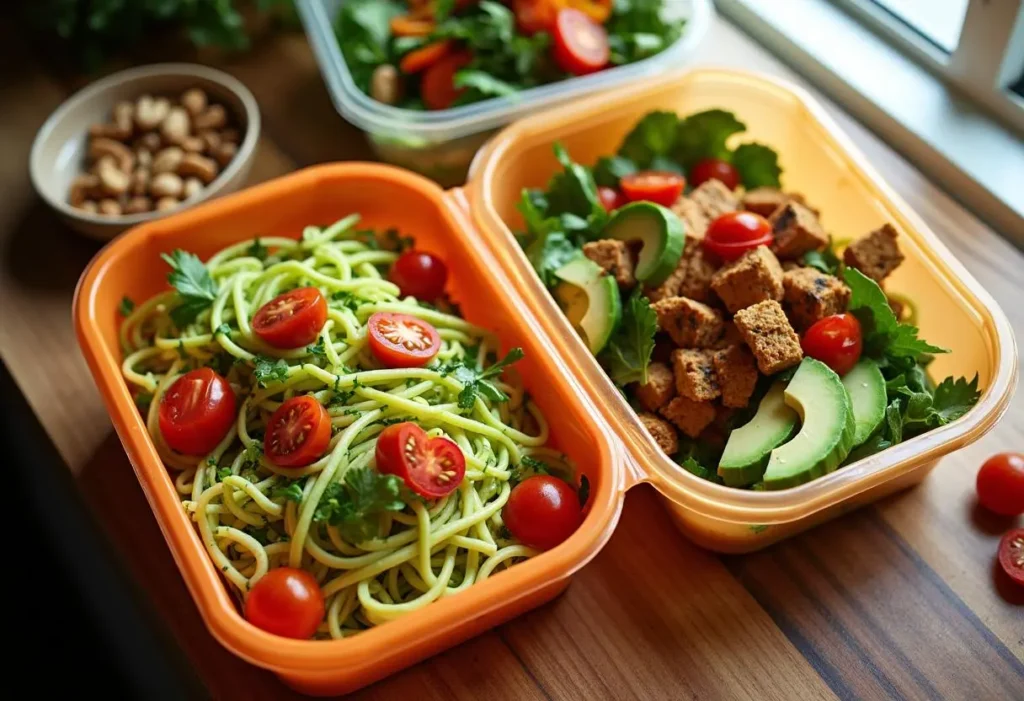
Tuesday
- Breakfast: Tofu scramble with avocado
- Lunch: Walnut pesto pasta
- Dinner: Eggplant lasagna with cashew cheese
Wednesday
- Breakfast: Coconut yogurt with nuts and seeds
- Lunch: Cauliflower soup with olive oil drizzle
- Dinner: Shirataki noodles with vegan Alfredo sauce
Need keto-friendly desserts to complete your meal plan? Check out Vegan Keto Cake – A Complete Guide to Delicious Low-Carb Vegan Baking.
Tips for Staying on Track on a Vegan Keto Diet
Sticking to a vegan keto lifestyle can be tricky, but with a few simple strategies, you can stay on track and enjoy delicious meals without compromising your goals. Here are some expert tips to help you stay on top of your vegan keto journey:
1. Plan Ahead
Planning your meals is a key strategy when figuring out what vegan food is keto. Batch cooking or prepping meals for the week ensures you always have low-carb, keto-friendly options available. This helps you avoid tempting carb-heavy foods when hunger strikes. Having pre-prepared meals will save time and keep you from making last-minute choices that might not align with your diet.
2. Read Labels
When shopping for vegan products, it’s crucial to read the labels carefully. You’ll want to know exactly what’s in your food to make sure it aligns with your vegan keto goals. Many vegan foods can contain hidden sugars or high-carb ingredients, which are not suitable for a keto diet. Always check for added sugars, starches, or other high-carb ingredients to ensure the food you buy fits into your what vegan food is keto list.
3. Stay Hydrated
Water is your best friend when following a vegan keto diet. Staying hydrated helps with digestion, maintains energy levels, and supports your overall health. Proper hydration also helps minimize any potential side effects of switching to keto. Remember to drink water throughout the day to stay energized and support your keto metabolism.
4. Join Communities
It’s always helpful to connect with like-minded people when following a specific diet, and this is especially true for a vegan keto lifestyle. Join online communities or groups where you can share experiences, get advice, and discover new recipes that align with what vegan food is keto. These communities provide inspiration, motivation, and support to help you stay on track with your diet.
FAQ : What vegan food is keto
1. What can a vegan eat on keto?
Vegans on keto can enjoy high-fat, low-carb plant-based foods such as nuts, seeds, avocados, coconut oil, and leafy greens. Additionally, tofu, tempeh, and vegan protein powders provide essential protein. Moreover, non-starchy vegetables like broccoli, zucchini, and spinach are keto-friendly. Including vegan cheese, coconut yogurt, and healthy oils can enhance meals. Therefore, meal planning is crucial to maintain nutritional balance.
2. Can I do keto if I’m vegan?
Yes, you can follow a vegan keto diet with proper planning and food selection. Since the diet excludes animal products, it requires consuming plant-based proteins like tofu, tempeh, and nuts. Furthermore, choosing high-fat foods such as avocados and seeds ensures adequate fat intake. Although it may be restrictive, supplementing with essential vitamins can support a balanced diet. Thus, a well-planned vegan keto lifestyle is achievable.
3. Is a vegan keto diet safe?
A vegan keto diet can be safe if managed properly with a focus on nutrition. Given its restrictive nature, ensuring a diverse intake of vitamins, minerals, and healthy fats is essential. Additionally, taking supplements like Vitamin B12, iron, and omega-3 can prevent deficiencies. Consulting with a healthcare provider before starting is highly recommended. Therefore, careful meal planning supports a safe vegan keto diet.
4. What is lazy keto?
Lazy keto is a simplified version of the ketogenic diet where only carbohydrate intake is tracked. Typically, followers avoid calculating fats, proteins, or calories. Instead, they focus solely on staying under 20-50 grams of carbs per day. Although this approach can be less restrictive, nutrient quality still matters. Therefore, choosing whole, keto-approved foods ensures better long-term results.
Conclusion
What vegan food is keto? The answer is surprisingly diverse when you know where to look. By selecting low-carb, high-fat plant-based foods, supplementing where needed, and following a well-balanced meal plan, you can enjoy all the health benefits of this unique diet.
Start your plant-based keto journey today and experience how this lifestyle can transform your health!






